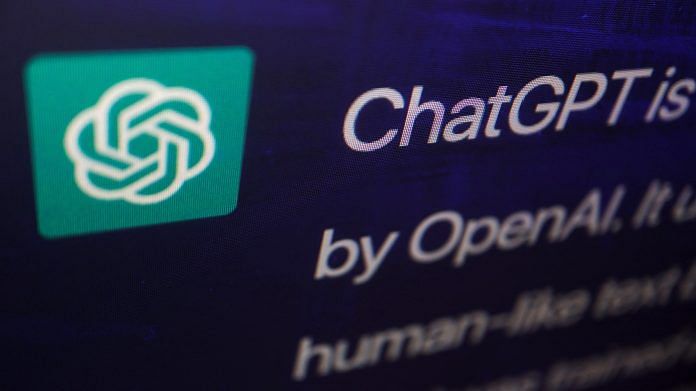In the end we shall make thoughtcrime literally impossible, because there will be no words in which to express it,” said Syme to Winston in George Orwell’s Nineteen Eighty-Four. In the novel, Winston Smith is in-charge of adjusting the past to the new narratives offered by the fictitious Party that rules over the imaginary state of Oceania. The truth is tightly controlled in Oceania.
Unlike Orwell’s Winston, who works for the Ministry of Truth, OpenAI’s ChatGPT — trained on machine-learning dataset — is likely to create trouble for the Chinese Communist Party (CCP) rather than solve the problem of ever-shifting narratives.
The ChatGPT chatbot, created by Microsoft-backed artificial intelligence company OpenAI, has created a buzz – and panic – around the potential of AI to shake up industries that rely on creating text-based content. In 2019, Microsoft invested $1 billion in OpenAI, which put the company ahead of its Silicon Valley rival, Google.
Just like the rest of the world, China is interested in capturing the potential of ChatGPT which can create uncensored content. The ChatGPT programme isn’t available in China because a foreign phone number is required to access the programme, but some software developers have found a way around it.
Beijing’s initial response to ChatGPT was to ban access to the service, which WeChat’s mini programme facilitated. That doesn’t mean the government and the companies have decided against developing the Chinese version of ChatGPT completely.
China’s internet giant Baidu has struggled with past iterations of a chatbot called PLATO-XL, which couldn’t answer basic questions such as when is Jack Ma’s birthday.
Baidu described PLATO as the world’s first ‘dialogue generation model’ trained on ‘11 billion parameters’, which gave the programme a very limited set of capabilities – responding to queries in single sentences.
After PLATO’s failure, Baidu started another project called Ernie — Enhanced Representation Through Knowledge Integration (Chinese name Wenxin Yiyan) — in 2019, a ChatGPT style bot that will likely be launched in March. Ernie is being trained on 260 billion parameters as compared to GPT3 trained on 175 billion parameters, though the former was trained on a smaller dataset.
Baidu has started collaborating with technology companies to develop Ernie for real-world use cases. Taiwan’s telecom company FarEasTone announced a partnership with Baidu to access Ernie through Baidu’s Smart Cloud.
And yet, creating a Chinese version of ChatGPT poses new challenges for the censorship regime in China.
Also read: ChatGPT buzz prompts Chinese tech firms to announce rival AI projects
Issues with China’s ChatGPT-like versions
The use of ChatGPT by students to write their school and university essays in English emerged as a challenge for the education sector in China as well.
The hashtag “Domestic colleges and universities have students writing papers with ChatGPT” was viewed over 91.5 million times on Weibo.
Baidu is aware of the pitfalls of training an AI programme on uncensored information, which is likely to create trouble when people ask the chatbot questions about politics.
The success of ChatGPT was possible because OpenAI could train the programme on natural language processing with robust datasets from academic papers, news articles, books, and social media posts. Baidu is training Ernie primarily based on Chinese language data and some English language data from Wikipedia and Reddit. But the ability to train a chatbot on a limited set of English data will likely restrict its usage among Chinese language users.
At the same time, there are other issues that will make it difficult to enhance Ernie or other Chinese chatbots currently under development.
The United States’ restrictions on access to semiconductor chips restrict the computing power the chatbot can use.
“Everyone wants to create ChatGPT now, but it’s very hard especially for Chinese companies which can’t get the latest Nvidia chips and have limited data sets for training AI models,” said Huan Li, creator of WeChaty, in an interview with Financial Times.
Baidu’s version of ChatGPT will likely mimic ‘memory hole’ from Orwell’s dystopian Nineteen Eighty-Four where past documents and history were altered to fit the ever-changing Party-approved propaganda.
CCP’s narrative on the Covid-19 pandemic is one example that showed the party needs a system to constantly adjust reality according to the latest instructions. Beijing claims to have made progress in developing machine learning and artificial intelligence, but ChatGPT’s success demonstrates CCP’s limitations when it comes to the unrestricted flow of information.
Despite insurmountable challenges, the CCP will likely use an English-language chatbot to spread its official narrative as the frenzy of AI technologies is set to change the world. But Baidu’s Ernie won’t be a genuinely independent chatbot that offers real-world answers to people’s questions.
Before we get too excited, the age of Party-approved propaganda spread through AI might be around the corner.
The author is a columnist and a freelance journalist. He was previously a China media journalist at the BBC World Service. He is currently a MOFA Taiwan Fellow based in Taipei and tweets @aadilbrar. Views are personal.
(Edited by Prashant)



